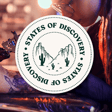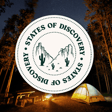Become a Creator today!Start creating today - Share your story with the world!
Start for free
00:00:00
00:00:01

Food Trends, Virality, and Impact: The Social Media Revolution in the Culinary World
In this all-new episode of States of Discovery, Marisa and Sara dive into the deliciously complex world of viral food trends and explore how social media has revolutionized our relationship with food. From TikTok's feta pasta craze to Guinness shortages caused by viral drinking challenges, we uncover these trends' cultural, economic, and societal impacts. Join us as we discuss the performative vs. purposeful aspects of food culture, the rise of mukbang videos, and the role of culinary influencers in shaping our tastes and habits.
What We Cover:
- How social media platforms like TikTok and Instagram have democratized culinary innovation.
- Viral food trends, including TikTok’s feta pasta, Dry January, and Veganuary.
- The global economic impact of food trends, such as increased demand for specific ingredients.
- The rise of mukbang videos and their reflection on consumerism and spectacle.
- How social media trends drive awareness about sustainability, cultural appreciation, and the ethics of consumption.
- A discussion on whether food trends are performative or purposeful—and how they influence industries.
Notable Statistics & Insights:
- In 2021, TikTok’s viral feta pasta video amassed over 600 million views and caused a surge in feta cheese sales globally.
- 81% of Americans reported discovering new foods or recipes online in 2020 (Pew Research Center).
- Studies show that 69% of millennials photograph their food before eating, reflecting the visual culture social media has fostered.
- Veganuary 2024 saw an estimated 25 million participants, with many adopting plant-based diets long-term.
Discussion Questions:
- Are food trends on social media purely for entertainment, or do they drive meaningful change?
- Have you ever participated in a food trend or tried a recipe just because it was trending?
- What do you think the next big food trend will be?
Connect with Us:
- Phone Number: 805-298-1420 - Leave us a message! We’d love to hear from you.
- Email: podcast@onlyinyourstate.com
Thanks for listening to States of Discovery. Until next time, bon appetit!
Transcript
Introduction to 'States of Discovery'
00:00:05
Speaker
Personal take, what's the next big food trend? Do you have any ideas? Is there anything you're like seeing online that, ah have you ever thought about creating one for, on your own? Oh God, no. I'm the one who's like, how do pasta?
00:00:24
Speaker
no
00:00:32
Speaker
Welcome back, everyone, to States of Discovery, the podcast where education and curiosity about the world to collide. I'm Marissa. I'm here with my co-host, Sarah. Hi, Sarah. Hello, hello, Marissa.
Social Media's Influence on Eating Habits
00:00:46
Speaker
Today, we're diving into the complex and delicious world of viral food trends, one that I know that I'm very tuned into. I'm not sure about you. um But we're going to be talking about the way social media shapes the way we eat, the way we think, and the way we even live. Yeah, I'm very pumped about this this episode, actually, on a personal level, because if you see my social media algorithm
00:01:11
Speaker
It is primarily food food and animal driven. um As it should be. Yeah, right. i I just can watch endlessly people cooking food, preparing food, new recipes. um I've always been fascinated by how we view food on so many levels, you know, going from just like a basic human level to a cultural level to an economic level.
00:01:39
Speaker
I think food and how we view food changes drastically sometimes depending on who you are, where you live, how much money you make, and so forth. Yeah, it really does. And I feel like it's so central to my life and what I'm passionate about, not only because of just, you know, it's sustenance, but also I just think it's a it's it's such a fun, creative way to express yourself. And I've been close to many people in my life who just simply view it as my body needs fuel, I will eat said fuel, and I give no other thought to it. And I cannot imagine, I just can't imagine being in that brain. um That's not how I function.
00:02:17
Speaker
Yeah, same. i Growing up, ah you know I was an operations manager at a gym, 24-hour fitness. And there was a lot of that. um you know Food was just a way to fuel your body. And a lot of people I knew were were cutting back calories and you know focusing on that. So it really was, they were counting their macros and doing all that stuff. So food wasn't fun for them.
Impact of Food Trends on Lifestyles
00:02:44
Speaker
It was just a way to source fuel versus what we're going to talk about today, that food trends and food culture has shifted so drastically for social media and oftentimes creating careers for people who have you know like very minimal food experience.
00:03:04
Speaker
Yeah. And look, we've lived through um the late 90s, early aughts days of just the body shaming, the anorexia, the bulimia, like just like it's an actual you know epidemic. And then people starting to embrace food, embrace their bodies. And then obviously as new trends come out, um there's like like you said, like counting your macros, what kind of diet, what fad diet do you want to get into? like I cannot tell you how many people in my life have just gone head first into a diet. I know we're going to talk about it later, but how you how media influences people to change really a huge thing apart of
Food, Body Positivity, and Economic Impacts
00:03:43
Speaker
their life. It's how they eat and what they consume.
00:03:46
Speaker
It's so true, you know, what you were saying, especially 90s, like around the time that I was growing up too, the big fad was like slim fast and snack wells and, you know, like weight watchers. Yeah. And and it's it is true that we have, I'm very, very glad that we're entering into this realm of body positivity and you know food making food fun again. in and I think social media has really played a huge, huge part in that because like essentially food trends have always existed, but today with social media and TikTok and Instagram, if food is being taken to a completely different level.
00:04:30
Speaker
and You know, were we're all privy to these viral TikToks, you know, the feta pasta craze that but had people eating whole bricks of feta cheese like it was normal.
00:04:41
Speaker
um why that is yeah It's just a casual Saturday night. got my cheese on. Yeah. And look, if you're if we're talking about that trend in general, um that had a pretty massive domino effect economically. So that video, the original video had over 600 million views in 2021.
00:05:04
Speaker
and it actually caused a surge in feta cheese sales across the US and Europe. That is wild. Right. for for Maybe like for most people that aren't familiar with certain you know like Mediterranean diets, they're probably like, what the heck is feta cheese?
00:05:20
Speaker
but let me melt it and put it over a pound of pasta and call it a day.
Global Access to Recipes through the Internet
00:05:24
Speaker
yeah yeah To me, Feta has always been ah Blue Cheese's more approachable cousin if you're having a salad. That's the stuff you can have if you're not really into the stinky cheese. That's true. Yes, I like that. More approachable, 100%.
00:05:40
Speaker
Yeah. Yeah. And so I do think, yeah, we're going to talk more about this too, like just the economic effects that these viral food trends have. And it's just like the internet's ability to disseminate information in such a rapid way has really democratized culinary innovation across so many platforms.
00:06:03
Speaker
and recipes, ideas that were once maybe confined to like specific cultures or countries now have this global stage and allow people to prepare it no matter where they are.
00:06:15
Speaker
But I do want to say, like as wonderful and revolutionary as this is, we also have to talk about the sort of um other extreme of that. And that is sort of the entertainment, almost gluttonous aspect.
Food as Entertainment: Mukbang and ASMR
00:06:28
Speaker
um I don't know if you're familiar with mukbang videos, but people sit down. And it's almost like an ASMR thing, which by the way, if you don't know, oh gosh, what does that stand for? It's like auditory sensory, something or other. um that's I think that's official.
00:06:43
Speaker
But basically, it sounds that are very pleasurable to you. And people watch videos and listen to things of just very soothing sounds. And to someone, a mukbang video, if someone's sitting down and in front of like a giant bowl of ramen, like a food challenge, eating it is like an ASMR or entertainment experience. I don't know if you've ever seen that.
00:07:04
Speaker
I can't personally suffer through it. Mouse sounds aren't my friend. Yeah, same. It's so interesting because it's like i used I used to really love Man vs. Food, Adam Richman, which I feel like he maybe is like the OG mukbang video creator because he would sit down and eat the and do these food challenges. and i you know like Once he started having a tough time and heavy breathing, I'm like, oh, I can't really watch this. you know I know. I wanted to reach out and tell him to stop. It's okay.
00:07:33
Speaker
Yeah, like A for effort, dude, you don't have to you know like kill yourself. But ah yeah, yes, I've never really watched the Mukbang videos, but um I do think it's fascinating that that is a whole like genre of entertainment. Yeah, and and look, so social media
Reshaping Food Culture through Social Media
00:07:51
Speaker
has caused that. So it's not just sustenance for us, it's entertainment, it's identity, it's even activism. Yeah, and in today's digital age,
00:08:01
Speaker
Social media platforms have not only transformed communication, they also revolutionize the way we experience, perceive, and even consume food. So from viral recipes to the rise of culinary influencers, the internet has reshaped and is still reshaping global food culture.
00:08:21
Speaker
Yeah. Speaking of how you eat food, i there was a moment in time when I first started getting into eating sushi where I literally, I was Googling like, how do I actually appropriately eat a piece of nigiri? Because you know you see all these people saying, oh, well we you got to do it fish side down into the sauce. You can't be soaking the rice in the soy sauce. What are you doing? Or eat it without the soy sauce or all in one bite. like social media, it really does influence how we just interact with food. um And in this episode, and we're going to be exploring the phenomenon of viral food trends, analyzing how social media and the internet have redefined our relationship with food and the implications of those changes as well as the societal impact they entail.
00:09:07
Speaker
At Only In Your State, we love travel. But we also love shopping for travel must-haves, you know, the accessories that you just can't live without, like the downright best hiking shoe for any trail, or even beach drink koozies that you can bury right in the sand. Find those and more at Amazon dot.com slash shop slash Only In Your State.
Culinary Exploration and Online Recipe Discovery
00:09:33
Speaker
Let's talk about social media and the role it plays in terms of food culture across the globe. Because according to the Pew Research Center, 81% of Americans reported discovering new foods or recipes online in 2020, which is wild, 81%. And this just further highlights the internet's influence on culinary exploration.
00:09:58
Speaker
And social media, the platforms aren't just conduits for food trends, but it's an active way to shape food culture. So take Instagram, for instance, something that all of us I think are pretty familiar with and how people take pictures of food. So it has there's a focus and emphasis on the aesthetic presentation of food that creates this and environment where quote unquote food porn thrives, if you haven't heard the term. And it's just basically,
00:10:26
Speaker
Hedonistic, does this look good? And so I'm sure that most of us have experienced sitting down to get a plate of food and either yourself or your friends whip out their phones to start taking pictures. um And actually, studies show that 69% of millennials photograph their food before eating. And I think I want to say that number is even higher, but maybe not. Maybe not.
00:10:49
Speaker
yeah
00:10:51
Speaker
I mean, yeah, I'm guilty of it. ah you know and Not that I'm considered a millennial, right? I think elder millennial. Elder millennial. I mean, we both are, and I think that's the ah specific term, yeah.
00:11:07
Speaker
Yeah, I mean, look, i I enjoy taking photos of my food. And it's not just because of the industry that I work in in terms of travel writing, but I enjoy food on an aesthetic level. It's not just for me, you know, the consumption of a delicious plate of food.
00:11:25
Speaker
I don't think it's necessarily a bad thing to take
Artistry and Creativity in Cooking
00:11:28
Speaker
photos because also I enjoy going back and like reliving those moments of of like a meal that I thought was beautiful, but it was also delicious. Yeah. And, you know, it's just a way of kind of documenting that. And I think we've come a long way in terms of food and the creation of food. And we're all just kind of finding artistic integrity in cooking and plating. And that's just like highlighting a meal even further.
00:11:56
Speaker
Oh my gosh. I could just watch videos, endless videos of people plating food. And like when they do the little wipes with the towel just to make it just so. And they do the little rolly bits with the butter. I don't even know what, there's a name for it, but when they make the little cone boy, it's just.
00:12:13
Speaker
It's a whole culture in and of itself. and Even if you're not a chef, there are times whenever I'm making the lamest plate of pasta and it's like, I just want to have it just so. I want to have it looking great. I want it to set it to be aesthetically pleasing. and yeah that I think that that is something we see on a larger scale throughout you know the food industry and restaurant industry.
00:12:35
Speaker
Yeah. ah do you Are you the type of person that when you're cooking food, like you will go out of your way? to like If you're sharing it with someone to make it look as good as a candy or do you kind of just not care? okay absolutely Absolutely. If I'm cooking for someone or someone's, they're not getting the burp pieces. I'm getting little flourishes. I'm making sure I put it on like the best plates. I don't know. yeah Do you? I love that.
00:13:00
Speaker
You know, I never really did what like ah I did, but I didn't. I think it wasn't until just like cooking because my wife, she will go above and beyond. like She will twirl the pasta in the spoon and and then like rest it on the... She does all that stuff and then her house is just like, I have to step up my game because I'm just like, here, here's a slice of pizza.
00:13:26
Speaker
I love it. This sounds like a paper towel. Here you go. You know what? Guilty sometimes. but's it's just like I'm more logically brained sometimes when it comes to that sort of thing, but you know I think it takes being around people that treat food as something completely different than what you're used to, to kind of open your eyes and be like, oh man, like this meal doesn't have to just be a regular Wednesday night
Challenges of Complex Recipes and Viral Trends
00:13:52
Speaker
meal. It could actually be an an experience.
00:13:54
Speaker
Yeah, although there is some growing pains there. I don't know if ah it was the rise of Pinterest and people having all of those recipes and Pinterest fails and like how you could see yeah people. um But the the launch of the show nailed it. Made me so unbelievably happy. Yes. And if you haven't, if you're not familiar with the show.
00:14:15
Speaker
It is basically ah all about having normal or maybe worse than average cooks attempt a recipe that you would find, you know, that a chef would make or on Pinterest and just to see how well they could pull it off. And typically it's an absolute disaster and so hilarious. I love it so much. It is. I've like, I really want to be on that show just to, because, you know, you're sitting at home and you're like, Oh man, I could have done a better job. But I know that if I go on there,
00:14:43
Speaker
I'm going to be really embarrassed. I think it would just be fun to try and recreate things, which kind of ties into what we're talking about with social media and how viewership of recipes is kind of like pushing people to create these meals. And then, of course, the economic impact of these trends, it's a worldwide thing. Guinness, the very popular beer brand, recently announced a shortage due to the increased demand for their beer, thanks to this TikTok trend, which I had to look it up because I was like, what is this? Is this like financially related? It's called splitting the G. And ah yeah, crazy. If you're not familiar, ah splitting the G. So typically, when you get served a pint of Guinness, it has
00:15:33
Speaker
the Guinness label on the side. And so the challenge is that in your first drink, you consume enough Guinness to align the level ah top level of Guinness with the middle of the G. So essentially, you are splitting the G in the glass after your first drink.
00:15:51
Speaker
Yeah, and just like this blows my mind that this... How did this originate? you know it's just like There's no way people are sitting around in Dublin trying to split the G, right? This is like just like a US thing or... No, no. it It comes from Irish pubs. I am almost 100% certain. This is insane. Like pub culture is a whole different thing over there and I think feel like they are very proud and maybe I am incorrect. And if we have any Irish listeners,
00:16:17
Speaker
please write in and correct us because yeah that's where I first discovered it was someone in Ireland commenting on it. I'm kidding. Yeah. It's crazy. Yeah. I mean, I kind of want to try it. I feel like I could do it. um Yeah. I don't like, sorry, I don't like Guinness that much. I like Stouts and Porters, but it's just like, it's a lot. It's heavy. And if you're getting that much Guinness in your first go, I feel like that would be an entire sandwich bread. just you Sure.
00:16:44
Speaker
Right. You're just drinking baguettes and then you miss it on the first try. And then if you're competitive, thus leading to a Guinness shortage. which But it's also like, what a really interesting thing that, you know, these brands and companies talk about going viral all the time because of this impact, because it makes a different difference for them economically.
00:17:10
Speaker
you know, it it translates into money, which I think was just like this really fascinating cycle. Yeah, it's ah it's like
Economic Impacts of Viral Food Trends
00:17:20
Speaker
the butterfly effect. I wouldn't be surprised. like i've I think that the food trends that I've seen in the past couple of years, so the feta trend, ah lots of pastina recipes, and it's really hard to find like the right pastina noodle. like like I love the little stars. you I can't find those anywhere. um They stopped making them. this Is that why? This was the whole thing, yeah, because I used to love pastina.
00:17:45
Speaker
growing up, pastina was in my house. Like if you're sick, you're eating pastina with just a little bit of butter, a little bit of pepper, salt, and that was it. And then I think it was Runzoni stopped making, they said that they were just going to stop making pastina. so That is how you say that. I always say brands, you know, in my head. That's like my head cam and like the letters were there.
00:18:08
Speaker
That's a fish. That is a fish.
00:18:13
Speaker
Yeah, but Pastina, that's a good one. um yeah What other food or beverage trends have you seen that just like completely took over? so My nephews taught me about the like no spill burrito challenge. like They were all excited to go get burritos and essentially they had to eat the entire thing in one sitting without
Evolution and Appeal of Vegan Food
00:18:33
Speaker
spilling.
00:18:33
Speaker
which I feel like I never, I mean, I guess there are some YouTube creator who did it. Food creator. I don't think I'm coordinated enough to accomplish that. No, oh no. no i dont ski burritoes I just like throw it on a plate. I can't.
00:18:53
Speaker
What about you? Have you come across any other trends that kind of stick out? You know, uh, besides just because I follow a lot of vegan food pages.
00:19:05
Speaker
um And for me, a lot of trends fall under like how can this be veganized, which I find so fascinating yeah because I love taking traditional recipes and turning them vegan, you know especially just like family recipes too. I love seeing how people can substitute certain products, not necessarily with like fake meat,
00:19:28
Speaker
but with vegetables or with spices. like I love that trend of veganizing something, but but not losing flavor or the enjoyment of the meal.
00:19:39
Speaker
Yeah. I mean, if you do it properly, which I cannot, let me just say, but if you can, it's an an incredible experience. like Every time I've gone out to a nice vegan place and they come out with some magic and I'm just jaws on the floor. I don't understand how it's done. Yeah. I was telling you, I went out to a sushi restaurant with some friends ah last weekend.
00:20:00
Speaker
And at this restaurant, they have a ah fake meat product called chunk, which sounds right. I know. I don't know who names these things. Come on, help us out. Right. Right. So but it is ah it's like a I think minimal, minimal ingredients, soy protein base. And they on the on the menu, it's a Japanese steak. um And it was even for all the meat eaters at our table.
00:20:28
Speaker
It was delicious. Texturally, it's just like steak. They seasoned it well. It wasn't gross. like It was just such a ah fun way to for meat eaters to enjoy a vegan steak, and they actually all loved it. And just like that alone, like we've come such a far, far away with food.
00:20:47
Speaker
Yeah, I will say that and even in the past 10 years, I feel like the vegan and veg options are just so much different because not only you have like these steaks are beyond burger even where it's like exactly the same as what you would consume. When I remember my cousin going vegan whenever I was maybe like middle school, her vegan chicken and tofurkey were the driest, strangest pieces of anything you could consume. And I'm like, today, you could swap them out and no one would know the difference.
00:21:16
Speaker
Yeah, 100%. Yeah. So in addition to the evolution of viral trends and that having economic impact, impact let's get back to how platforms like TikTok and YouTube and even reels Instagram reels a little bit.
Cultural Impact of Mukbang Videos
00:21:34
Speaker
But they've caused like new food sensations and trends that would never have been in our atmosphere to begin with. So like mukbangs, they're a South Korean phenomenon where individuals eat large quantities of food on camera. I'm talking you can take a very slight woman, just a petite little thing, and you have a whole like dinner table full of food, like a seafood boil or noodles or just it's just wild. And then you have people like Nikocado Avocado, who I don't know if you're familiar with, but is just one part mukbang person, another part troll. um It's he's very divisive and there's caused a lot of drama, especially with his recent weight loss. I don't know if you follow it, it's just taking the internet by storm and it's created this giant spectacle. And it's
00:22:19
Speaker
It's just virality is what it is. and so It's almost like how clickbait had evolved editorial offerings online. It's the same way that these sort of viral trends have influenced food entertainment, food consumption, food recipes online.
00:22:37
Speaker
yeah and just You know, watching someone eat massive amounts of food, why do you think this is so captivating, so much so it's it has ah an audience, a large audience?
00:22:49
Speaker
I mean beyond the like the spectacle of the extreme and why we you know why people go to Cirque du Soleil or like these extreme shows, it's also a bit of consumerism as well because this showcases indulgence and it turns food into this spectacle that honestly anyone can enjoy, and but in a way that relates to um consuming in excess.
00:23:16
Speaker
And is it's not just, like I said, at a table with a bunch of bowls of, ah I don't know, mashed potatoes. It's people going to a restaurant in their car and getting a haul. So like, you know how the consumerism shopping halls, like I just shopped on Xi'an and spent $5,000, here's what I got. it's I just went to this place for food, order the entire menu, the top 20 items and watch me eat it. um so I think there's a way that it has had some negative impacts on one people's
00:23:49
Speaker
um spending behavior, their consumption behavior. But I do think that there's been an evolution to where some folks who do mukbangs now promote more mindful eating, or maybe they're showcasing food from different cultures, or maybe they're ah using it as a learning opportunity. um So it started as something very niche, and it's now growing in a way that I don't think anyone could have foreseen. Yeah.
00:24:14
Speaker
It kind of reminds me, I remember when I read the Hunger Games series back in the day, and two of the tributes go to like the really ah this really wealthy dinner party in a prominent area of the city, and everyone there, the the you know city locals and the the wealthy people that were attending,
00:24:37
Speaker
would take would They all ate dinner and they like gorged themselves and then they would take this pill that would make them throw up just so they could keep eating. yeah and it was like that and the The two tributes that were there from like lower class areas were like, what is this nonsense? like How are you guys consuming so much food and then you want to throw up just so you could consume more?
00:25:00
Speaker
yeah you know because and That kind of like ties into, that reminds me like of mukbangs, just because of my like thinking about overconsumption, thinking about people that you know like are in lower economic standing and they don't have access to consume food at that level.
00:25:17
Speaker
It's wasteful. It's interesting. and ah I do think that um not only does it promote this sort of gluttonous behavior that is potentially wasteful or could have negative impacts on our um our sustainability just in general as a country or as a group, but on the opposite end, some of these food trends, why not really food trends,
00:25:42
Speaker
people taking injectables so they're not hungry, and people which I think there are a lot of people who genuinely need it for health reasons, but there's also been folks hosting
Unhealthy Behaviors and Societal Issues from Food Trends
00:25:52
Speaker
Ozempic parties. and you know and I'm not going to comment either way on the prescription itself, but there are people there similar to the early aughts in the 90s where it's starting to spiral out of control in terms of these viral trends surrounding food, influencing people in a way that might not be so healthy or positive. Right. Yeah. That's a very good point. and I think this is a good
00:26:19
Speaker
kind of segue into the performative aspect of food and how, especially when it comes to food trends and social media, there's this very fine line between performative and purposeful. And a lot of, I feel like TikTok videos or Instagram videos are towing that line between performative and purely entertainment driven and then actually purposeful. And you know some of the trends that are very popular right now, dry January, veganuary, they come to mind here. I know, say that five times fast. yeah Can we work out the name a little bit? i mean i Right, 100%. And it's just like its every January. So we see a flood of people that are posting about giving up alcohol for dry January or
00:27:15
Speaker
for Veganuary going vegan for the month. So is this all performative? Does this have a real world impact? What do you think? I think it's a mix. I think there are plenty of people who do it just for the clout. Social media amplifies the movements and they're getting extra engagement and visibility due to it. But I do think even keeping that in mind, it creates awareness and it also gives people a community to perform something that is maybe difficult for them.
00:27:47
Speaker
so There are a lot of people who maybe experienced dry January and they want to try it, but they have a community of support. So if they want to kick a bad habit, there is now is the time to do it whenever there are so many people doing it with you. And for a veganuary, it's encouraged people to try plant-based diets that maybe they haven't before, and some stick with it even after January. Yeah.
00:28:09
Speaker
Yes, i I do have people that I know who have tried dry Dry January. They've enjoyed it so much for that month that they've done it for the remainder of the year. They've stopped drinking alcohol just because they it they felt good about themselves. Their body felt great. you know They were getting restful sleep.
00:28:27
Speaker
So I do think in that, you know, it's, it could be worse, like worse food trends or, you know, these are, these are trends that are actually helping people, helping the environment, especially for a veganuary. And so, but the question, does it help that it's, that it's trendy? Is there, does it pressure people to post their journeys just for the likes without maybe fully committing to the idea of it?
Trendy Challenges and Cultural Awareness
00:28:54
Speaker
I mean, look, it's it's creating an impact either way. In 2024, an estimated 25 million people participated in Veganuary. So giving up animal products for the month, but not only that, but a lot of people stuck with it and continue to give up animal products. Yeah.
00:29:12
Speaker
Yes. And I think while, sure, you're always going to have a couple of people that are just, but you know, performatively doing this to get some sort of social media clout. I do think these types of food trends, especially when they're rooted in just like good for people and good for the planet, it helps shift industries. It helps boost certain areas, especially you know for plant-based diets or non-alcoholic beverages. We talked about in our dive bar culture episode that you don't have to necessarily give up alcohol for dry January. You can just shift to non-alcoholic beverages and still enjoy being social with your friends, but just you know like have that same... It'll have that same impact.
00:29:57
Speaker
um which I think is is interesting. And whether performative or not, social media can really help to push companies and individuals towards ah more sustainable practices long-term for sure. So let's zoom out a little bit because we're talking about social media, the broader impact that it has.
Social Media's Role in Cultural Shifts
00:30:15
Speaker
Social media doesn't just create trends. it It really shifts culture. And we've talked about these viral food challenges to, you know, the economic growth influencing supply chains, like with Guinness, for example, there is a tangible impact on these food trends.
00:30:36
Speaker
Yeah, and the trends do create waves that, I mean, from my perspective can be incredibly good. And like we said, double-edged sword also, maybe not so good, but they've have normalized conversations about sustainability, about cultural appreciation, as well as appropriation and the ethics of consumption.
00:30:54
Speaker
Yeah. And also at the same time, they also highlight our vulnerability to marketing trends, hype, you know, what does it say about us that we'll try a recipe just because it went viral?
00:31:09
Speaker
Yeah, I came across a comment today um that humbled me so deeply because it was on some video. I don't know about what at this point, but ah in my head, I was actually considering the video on social media and the truth of it. And I was like, wow, does it really do this or can I really do that? And I saw a comment that was like, do you guys not remember infomercials?
00:31:34
Speaker
but Every claim under the sun, I'm like, actually, you're right. this is I mean, look, we're human. We're curious. We're connected. We want to learn, but sometimes maybe we're quick to follow the crowd or we're quick to believe something that doesn't you know that maybe requires a little bit more thought. So having consuming this kind of media is fabulous, and I know I do it every day, but we also need to balance it with mindfulness.
00:32:02
Speaker
yeah Yeah. So yeah, social media's role in food trends is very complex. One thing is very clear. It's reshaping how we think about food and culture. Yeah. So whether it's dry January, vegan and you wear that field, this doesn't feel right to say, I'm sorry. ah Muck bangs, ah viral pasta recipes. So these trends just reflect who we are as a culture and where we're going.
00:32:30
Speaker
and so Personal take, what's the next big food trend? Do you have any ideas? Is there anything you're like seeing online that ah have you ever thought about creating one for your on your own? Oh, God, no. I'm the one who's like, how do pasta? I'm just like googling. How do pasta is good?
00:32:58
Speaker
Yeah, i am ah I love looking up recipes um and following recipes as for making them. I feel like when it comes to food trends, aesthetic trends, beauty trends, I am an observer and learner. I am not a first mover. How about you?
00:33:19
Speaker
Same. Yeah. Kudos to the people that think of these things. Cause, uh, I do, I probably make one to two recipes I see online, like on social media, I'll see it and be like, I just made a recipe last week. It was a.
00:33:32
Speaker
tofu satay skewers with a peanut sauce that was like 10 out of 10, so good. yeah um But that's where, and Pinterest too, like I'll go to Pinterest if i'm if I have time at night and I'm like, hey, I think I want to get a little creative. I'll just find a recipe, give it a shot. And to me, I love following a recipe. I'm not really one for creating a recipe.
00:33:56
Speaker
You know what I would like to see? And this isn't something I've seen yet, but it's something I do all of the time. it's the You're at the end of your pantry, at the end of the fridge, and you're just making something with whatever's in there. That gives you the freedom to just be creative of like, well, I have beans, cheese, and tortillas. I know there's something there. I have someone who can make something, but we're going to have to figure out what it is. Yeah. No, that is fun. That that is definitely a fun way to to look at it too and be creative in your own right.
00:34:25
Speaker
but Yeah, we're going to be launching the podcast, ah almost empty pantry. and Here it is, just pasta, Pasadena. I'll pasta you. Yeah, well, all right. I think this has made me hungry, oddly enough. Just thinking about all the things that I had never tried the viral pasta trend, but maybe I'll have to. not ah Maybe not a whole brick of um feta, but you know yeah ah half a brick. That's good. yeah
00:34:58
Speaker
right All right, also, thank you for turning it tuning in and turning into States of Discovery. ah Don't forget to subscribe, share, and follow us on social media. And until next time, happy adventures.
![Welcome to Orlando: The Magic Beyond the Theme Parks [ 3 Part Series] image](https://media.zencastr.com/cdn-cgi/image/width=112,quality=85/image-files/62f4203e12b42701701687ad/e818c2bf-fab6-4f0c-802e-04fdc21f598a.png)












